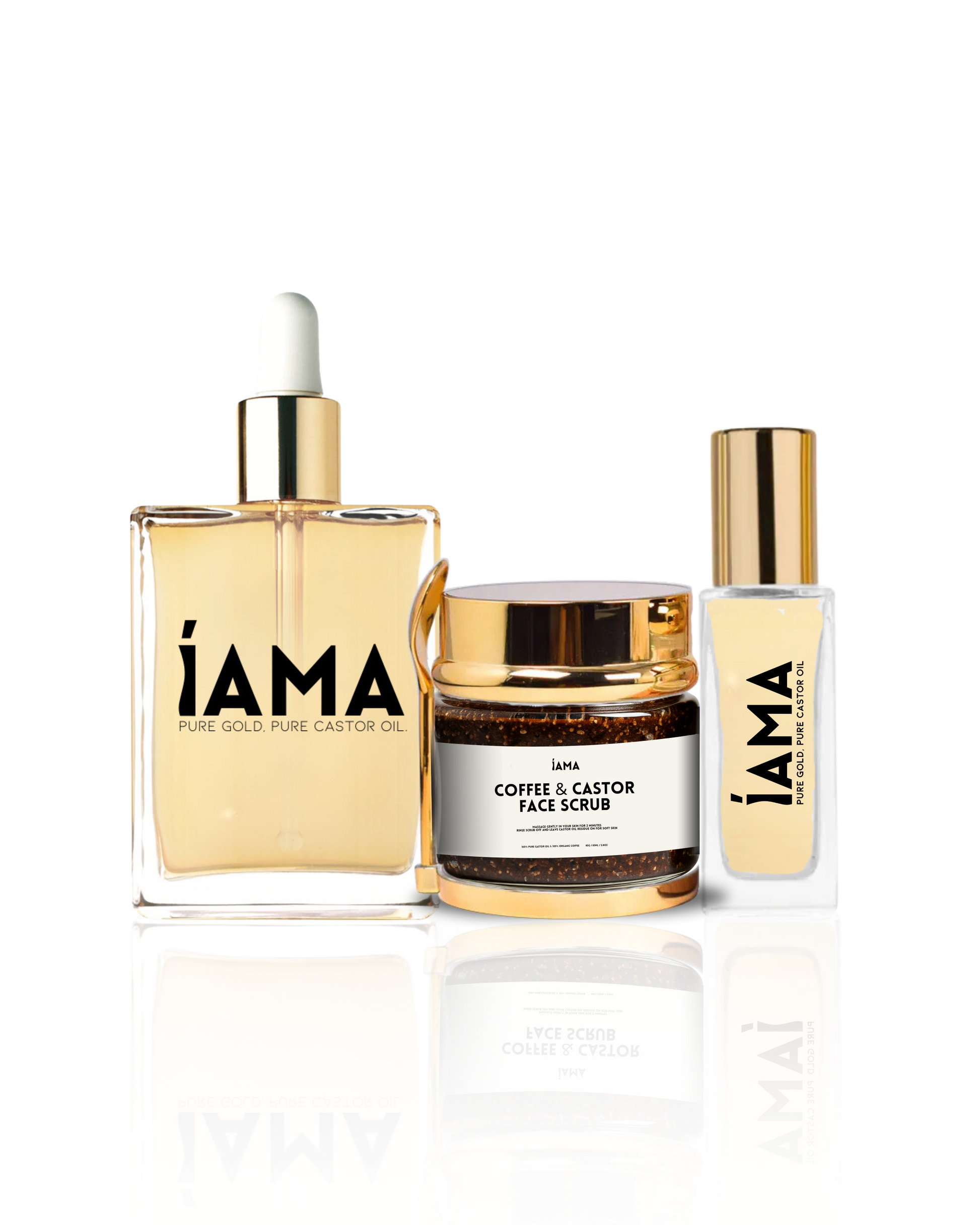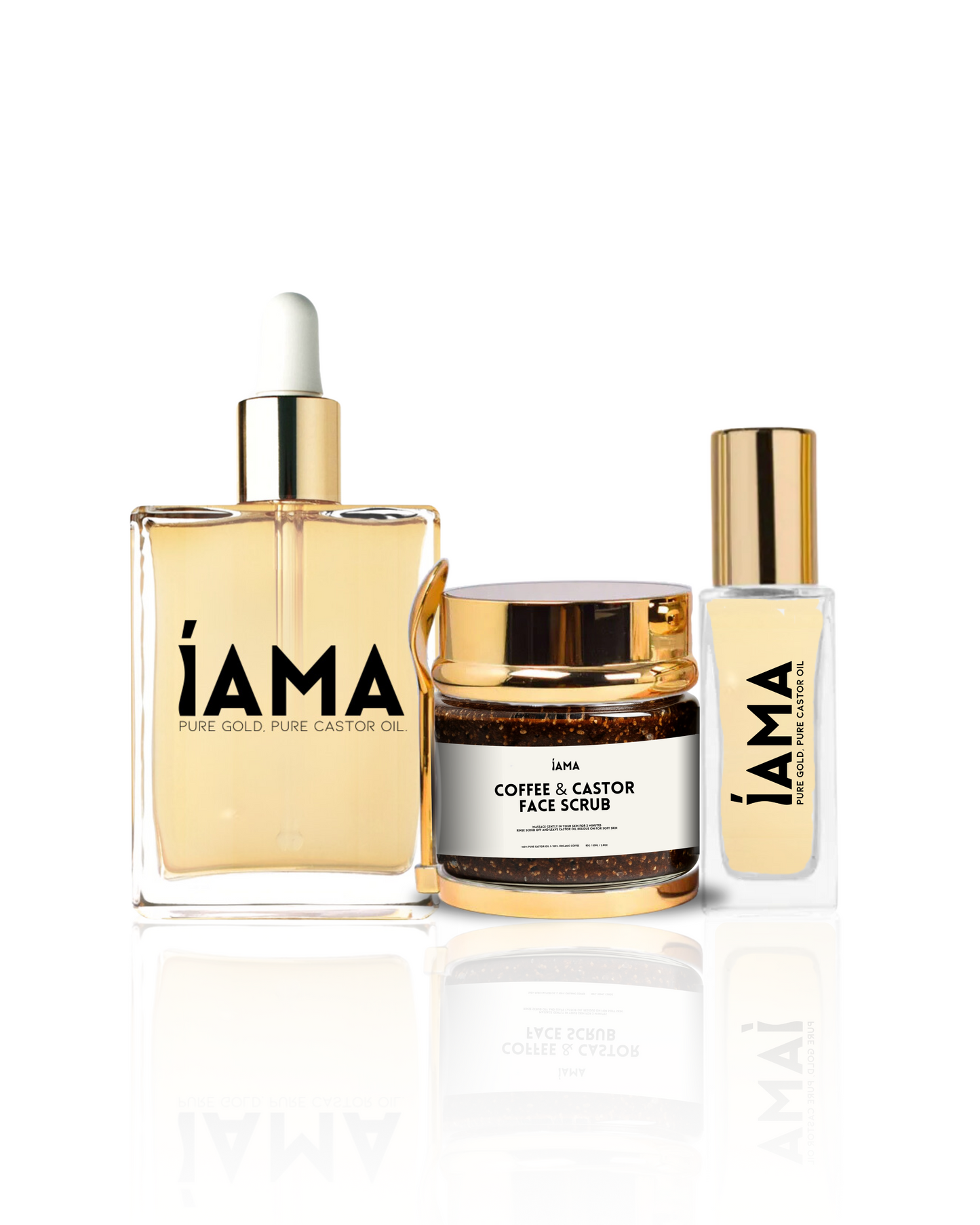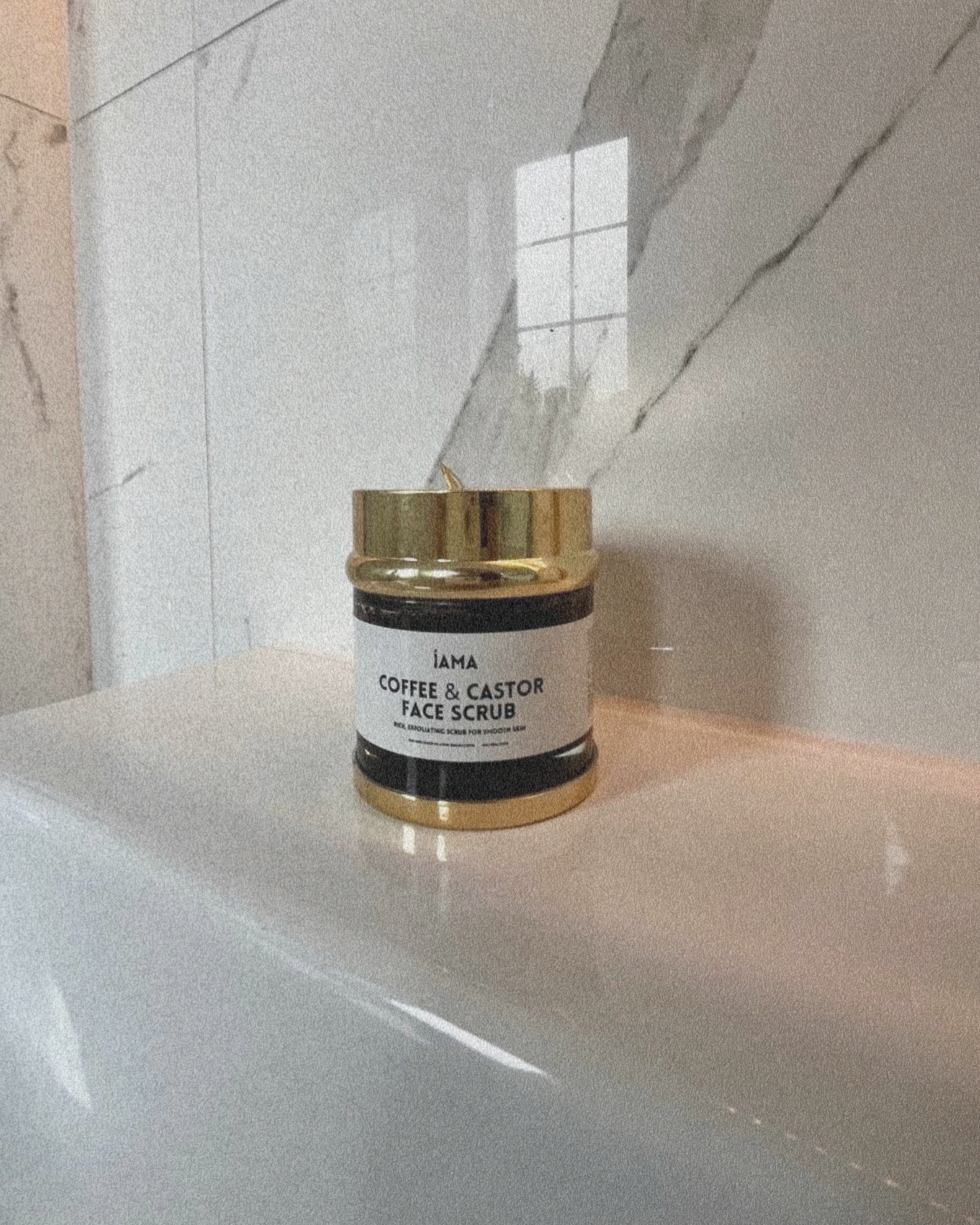If you're one of the millions dealing with the frustrating symptoms of eczema - the relentless itch, the red, inflamed skin - you're probably desperate to find natural remedies that can provide some much-needed relief.
Perhaps you've tried loads of different moisturisers for eczema prone skin and you're finding that they're not working well or are irritating your skin even more.
In this blog post, we'll dive into the science behind using IAMA castor oil to naturally soothe and heal your eczema.
What is Eczema?

Eczema, also known as dermatitis, is a chronic, inflammatory skin condition that affects millions of people worldwide. Dermatitis refers to any inflammatory skin condition of which eczema is very common.
Eczema is actually caused by an overactive immune system that causes your skin to become dry, hypersensitive, and prone to flare-ups. The triggers can include stress, irritants, or changes in diet or the weather, as well as the products you use on your skin.
There are 7 types of eczema and it's possible to have more than one type at the same time:
-
Atopic dermatitis: This is a common form of eczema which causes inflammation, dryness and itchy skin. While typical in small children, it can occur at any age.
-
Contact dermatitis: This form of eczema, also called allergic contact dermatitis, is brought on by environmental triggers.
-
Dyshidrotic eczema: This type of eczema dries out the skin and can cause a burning sensation, rashes and blisters.
-
Neurodermatitis: This form of eczema, also called discoid eczema, affects small patches of skin. It makes them itchy and scaly.
-
Nummular eczema: This form of eczema, also called nummular dermatitis, creates small, rounded lesions all over the body, but especially on arms and legs.
-
Seborrheic dermatitis: This is an inflammatory form of eczema which affects your scalp.
- Stasis dermatitis: This type of eczema presents as a skin discoloration on the legs which looks similar to varicose veins.
The result is that angry, itchy rash that just won't seem to go away no matter how much you scratch. It can be disruptive to your daily life, not to mention uncomfortable as heck.
But the good news is there are ways to manage those eczema symptoms and find some much-needed relief, including the use of a humble yet powerful ingredient: castor oil.
The Link Between Eczema, Inflammation and Childhood Trauma

Our skin is our biggest organ and is the protective barrier between us and the outside environment. We literally wear our emotions (and nervous system) on our skin. This is why it's really important to understand the deeper root causes that could be causing your eczema, and not only treat the symptoms.
When we experience fear, trauma and other strong negative emotions, the body responds by releasing a cascade of inflammatory cytokines. This is part of our natural "fight-or-flight" stress response.
However, when our body has done this for a prolonged period, especially during childhood when the brain is and immune system are still developing, it can begin to rely on this as a base level of operating. This effectively programmes the body's immune response into being hypersensitive or overactive.
This is why eczema often develops during childhood.
Studies have found that individuals who experienced traumatic events or high levels of stress as children are more likely to develop atopic dermatitis (eczema) later in life.
The type 2 inflammatory response that predominates in eczema seems to be an enduring consequence of this early life adversity. Furthermore, research shows that people with PTSD have higher circulating T lymphocytes, which can exacerbate immune-mediated dermatologic disorders such as eczema.
So for many eczema sufferers, their condition may have roots tracing back to formative childhood experiences. Addressing this trauma-inflammation link through therapy, somatic healing, stress management, and anti-inflammatory skin treatments like iAMA castor oil could be an important part of a comprehensive eczema care plan.
If you'd like to read more about treating childhood trauma and chronic health conditions at the root cause through somatic, nervous system healing check out Safa, our co-founder's website.
How Castor Oil Can Reduce Inflammation

Castor oil has some fascinating properties when it comes to addressing the underlying inflammatory mechanisms at play in eczema.
The key lies in castor oil's rich composition of fatty acids, particularly ricinoleic acid.
Ricinoleic acid inhibits the production and activity of those inflammatory cytokines like interleukin-4 (IL-4), interleukin-5 (IL-5), and interleukin-13 (IL-13). These are the very same type 2 cytokines that play a central role in triggering eczema flare-ups!
By shutting down the signaling pathways of these pro-inflammatory cytokines, castor oil can help break the vicious cycle of skin inflammation, barrier dysfunction, and worsening symptoms. It essentially puts the brakes on the immune system's hypersensitive reaction.
The oil also contains compounds that can modulate the activity of immune cells like mast cells and eosinophils, further dampening the inflammatory cascade.
And its deeply moisturizing properties help repair the damaged skin barrier, preventing irritants from penetrating and causing additional inflammation.
Benefits of Using Castor Oil for Eczema
 IAMA Castor oil is 80% ricinoleic acid and completely organic and unfragranced. Ricinoleic acid is scientifically proven to have an anti-inflammatory effect on your body. You can read more about how that works on our blog post here.
IAMA Castor oil is 80% ricinoleic acid and completely organic and unfragranced. Ricinoleic acid is scientifically proven to have an anti-inflammatory effect on your body. You can read more about how that works on our blog post here.
The main benefits of using Castor Oil for Eczema are:
1. Naturally Reduces Systemic Inflammation: The ricinoleic acid in castor oil can help to decrease inflammation in your body and reduce the redness that is commonly associated with eczema.
2. Moisturises Naturally at a Cellular Level: Castor oil is rich in ricinoleic acid, a fatty acid that penetrates deeply into the skin and hair shaft. This helps to moisturize at a cellular level- not just on the surface.
3. Improves Moisture Retention: Castor oil is a humectant which means it attracts and holds water. This means it acts like a protective barrier on your skin or hair. When you apply it, it forms a thin, sticky protective layer that is gradually absorbed and helps lock in moisture whilst still allowing your skin to breathe.
4. Soothes Irritation & Improves Skin Texture: Castor oil's potential anti-inflammatory effects can alleviate the constant itchiness. The oil softens and smooths the cracks and gaps in your skin.
5. Rebuilds Your Natural Skin Barrier: Research indicates that castor oil may help to strengthen the skin's protective barrier, which can be compromised in individuals with eczema -especially if it began in childhood.
6. Rebalances the pH of your skin to Prevent Dryness: Castor oil helps maintain the natural pH balance of your skin and scalp, which is crucial for retaining moisture and preventing dryness.
What our customers say
"I’m a mother to a 4 year old who suffers from eczema and i just wanted to express my gratitude for this product and the formula created to make this amazing oil as it cleared my daughters severe eczema flare within 3 days and her skin looks amazing ! and she’s not flared since. highly recommend this product i also use it myself daily and skin feels nourished and smooth and i use it in my skincare/ body care routine daily - Lara, London"
How to Use iAMA Castor Oil on Eczema

With IAMA castor oil you're using a completely natural, fragrance free and organic product created by nature herself. It's important to also reduce other sources of toxicity and inflammation that could be affecting your immune system, and of course, try your best to manage your stress levels.
Top tips for using Castor Oil for Eczema Relief:
1. Massage castor oil into your skin before bed: Gently massage in small circular motions, the castor oil onto the affected areas of your skin.
2. Let the oil absorb for 15 mins and repeat if you feel the urge: It can take about 10-15 mins for your skin to completely absorb the oil. You'll know this has happened when you skin feels smooth to touch and not sticky. You can apply another layer and gently massage in.
3. Use it consistently for at least 2 months: Use our organic, cold pressed castor oil consistently every night for at least 2 months. It's important to commit to healing your skin naturally, which takes time. Your body's immune cells need to adapt and respond and regular application will support this rather than a sporadic approach.
4. Set an intention to heal: Castor oil is incredibly healing and completely natural, derived from mother nature herself. Therefore you can programme the castor oil with specific healing intention. If you have eczema you might want to work with the root causes. As discussed above, you may have had a traumatic childhood or have had alot of health issues in your life. Journaling and using castor oil mindfully is key to healing your skin - which is your biggest organ.
Try Our 100% Organic, Cold Pressed Castor Oil for eczema.
iAMA is the home of pure gold, pure Castor Oil.
Shop www.iamawellness.com
Contact contact@iamawellness.com
Follow @iamawellness






